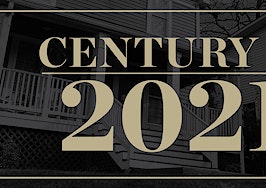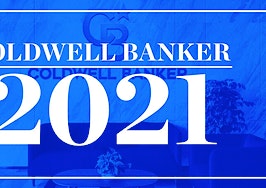Today’s the day: Join us for Inman Connect Now today to dig into key topics like relationship strategies, current and future trends, lead generation, and much more. Register now to watch the rest of the day live, and catch up on what you missed on-demand.
Century 21 is celebrating its 50th anniversary as a real estate brand in 2021 and in those five decades, the company has learned a lot of lessons, CEO Mike Miedler said Tuesday during the general session of Inman Connect Now.
One of the biggest learnings the company has pulled from all those years is exactly what’s leading the company down the path of building an open architecture technology platform and avoiding the end-to-end experience being sought by so many competitors.
“It will be really difficult to get every single agent and every single broker in every single local market to use every single piece of technology that you have,” Miedler told Clelia Peters, a venture partner at Bain Capital and the president of Warburg Realty.
“I do think folks might learn that lesson and might learn it the hard way,” Miedler added. “We did over many years of buying technology, integrating technology and building our own technology.”
Another reason that Century 21 isn’t trying to build an end-to-end solution is that there are already tons of great solutions out there, and Miedler said he doesn’t want to get stuck “standing-still” and creating a platform when there’s always going to be something new, something more exciting or something better.
He specifically pointed to SkySlope, an industry-leading transaction management platform.
“They’re excellent as the back end of the transaction,” Miedler said. “Leave it to them.”
“For me, from a technology standpoint — I see so many different competitors out there and other companies quite candidly looking at end-to-end solutions or the thing that they believe will ultimately help their agents be more successful,” Miedler added. “I gotta tell you, from a lot of building and a lot of testing and mistakes quite candidly — and I think it’s happened a lot in our industry — I don’t necessarily know that I would consider technology a differentiator.”
Realogy and its affiliated brands — Century 21, Coldwell Banker, Sotheby’s International Realty and Better Homes and Gardens Real Estate among them — have long evangelized the idea of open architecture technology, essentially an ecosystem where agents and brokers can have some form of connectivity between technologies being offered by various vendors in the market.
Miedler said the company likes to compare the platform to a dresser, where Realogy built the dresser and agents and brokers can choose what they’d like to put in the dresser.
From the company’s own research, agents are using between six and 12 different platforms to run their businesses. But the issue the company has found is that none of those solutions — platforms like transaction management, customer relationship management tools, back-office tools — talk to each other.
“Our vision and what we’re trying to build is more of an open architecture-type platform where each one of these disparate parts can speak to each other throughout the transaction,” Miedler said.
“It’s our job as a real estate industry to weave together platforms that are being used for the consumer so that they can all talk to each other and be seamless,” Miedler added. “That is the way that we are going to be able to provide the best experience for our real estate agents to make them more effective.”
Speaking more broadly to the technology trends shaping the industry, Miedler believes the COVID-19 pandemic and associated stay-at-home orders that ruled the early days have pushed the real estate industry forward in a positive way.
“I can’t tell you how many real estate professionals that I know had to teach clients how to use Zoom, or Teams, or Google Meets or name it in order to have this type of interaction and not meet face-to-face in an office or at a house,” Miedler said.
Even things like remote online notarization are becoming ubiquitous. At this time last year, many people had never heard of the concept before and it was still outlawed by many states.
Ultimately, the push for more technology adoption is leading to a better experience for both the consumer and the agent, Miedler said.
“The last year, in general, has taught us that we have to adapt and we have to move quickly,” Miedler said. “The consumer demand is there and we’re going to have to listen to what that is.”





